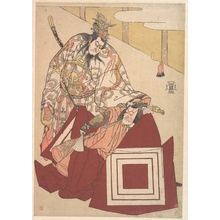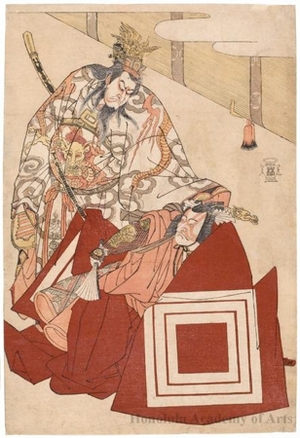Katsukawa Shunsho创作的日本版画《Ichikawa Danjürö V as Miura Arajirö and Nakamura Nakazö I as Taira-no-Tokitada》
标题:Ichikawa Danjürö V as Miura Arajirö and Nakamura Nakazö I as Taira-no-Tokitada
日期:1786
详情:更多信息...
来源:Honolulu Museum of Art
浏览所有5,476幅版画...
描述:
This print depicts Ichikawa Danjürö V as Miura Arajirö in shibaraku costume with kumadori makeup, and Nakamura Nakazö I as Taira no Tokitaka in ornate Chinese robes. It documents the Miyako-za Tenmei 6 (1786) production of “Mutsu no hana Izu no Hatage,” presented for the theater's kaomise (the opening of the season) offering in the 11th month. According to Timothy Clark and Osamu Ueda, an evil courtier is about to order the execution of some hapless victim onstage when cries of “Shibaraku!” (Stop right there!) are heard from the back of the theater, and a hero dressed in a distinctive persimmon-colored costume with fantastically large square sleeves enters down the hanamichi walkway to save the day. The “Shibaraku” scene is the ultimate confrontation between good and evil in Kabuki, and the most perfect display of the bombastic, stylized aragoto (rough stuff) acting style associated with the Ichikawa Danjürö line of actors. First performed by Danjürö I in 1697, it became obligatory from the early eighteenth century to include the scene in kaomise (the opening-of- the-season) productions held at every theater in the eleventh month of each year. (from “Capturing Actor’s Spirit/Shunshö” exhibition 1/15/2009-)
相似版画

